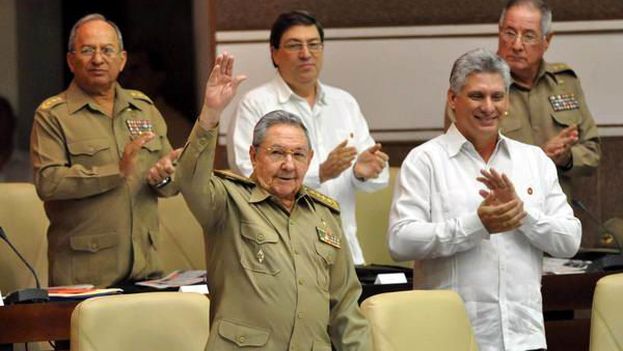
![]() 14ymedio, Reinaldo Escobar, Havana, 29 March 2018 — In the ten years that Raúl Castro has served as president of the country, he has annulled prohibitions, promulgated laws, established relations with the United States, repressed opponents and, gradually, eliminated some of the distinctive features of his brother’s way of governing, that is, dissolved Fidelismo.
14ymedio, Reinaldo Escobar, Havana, 29 March 2018 — In the ten years that Raúl Castro has served as president of the country, he has annulled prohibitions, promulgated laws, established relations with the United States, repressed opponents and, gradually, eliminated some of the distinctive features of his brother’s way of governing, that is, dissolved Fidelismo.
The method used by the General consists of taking short steps, leaving open the possibility of advancing or retreating depending on how events evolve. On more than one occasion he appealed to a succession of advances and retreats, but never returned to the starting point from before the changes were made.
With his “gradual method” the octogenarian president has tried to tame the laws of dialectics. The motto he offered in a speech some years ago – “without haste but without pause” – underlies his deliberate purpose of delaying the moment in which the quantitative accumulation of modifications generates a new and “undesirable” quality in the Cuban reality.
In this way, Castro has proceeded with immigration reform, the extension of self-employment, the leasing of land under usufruct, the authorization to buy and sell homes and the approval of professional sports, among many other decisions of his mandate. In each case hesitation and slowness have hampered the reforms.
The motto “without haste but without pause” underlies his deliberate purpose of delaying the moment in which the quantitative accumulation of modifications generates a new and “undesirable” quality in the Cuban reality
The initial flexibilizations applied to travel and immigration continued the trend of eliminating obstacles, although in their practical application there have been serious setbacks, especially in the arbitrary prohibitions against opponents and activists of civil society leaving the country, or when deciding whether to allow the entry of exiles who have been more critical of the Government.
After the expansion of self-employment, no new private activities were permitted and, last August, there was a freeze imposed on the issuing of new licenses in the most important occupations. The availability of wholesale markets, the right to import and export, and the facilities to obtain financing from abroad remain unsolved.
The application of a measure that allowed land to be leased in usufruct began with a set period of ten years, which was then extended to 20, but the limitation remains that “to receive land, natural persons will have to work and manage it personally and directly,” together with restrictions on what can be produced and how that production can be distributed.
The right to sell real estate has been one of the most popular flexibilizations and has widened social differences, the precise contrasts that the ruling party has always feared. Early implementation began with significant freedom to establish prices, but later the State imposed referential rates to increase the collection of taxes.
The acceptance of professional sports is, perhaps, one of the greatest heresies committed by Raúl Castro, contradicting the Fidelista catechism. It began with timid payments to high-performance athletes and has been extended to allowing Cuban athletes to be hired by foreign clubs, but has not managed to stop the exodus of sports figures abroad.
In other aspects, such as the elimination of schools in the countryside, allowing Cubans resident on the island to stay in hotels, access to cell phones, foreign investments, and the increase in – very slow – internet connections, there have been advances, some discreet and others more radical.
There remains a terrain where Raúl Castro did not want to take a step, as if it were a minefield: political liberties
However, there remains a terrain where Raul Castro did not want to take a step, as if it were a minefield: political freedoms. Although a moratorium on the execution of the death penalty was implemented under his administration and Law 88 – which imposes stiff prison terms for ‘subverting the internal order’ – has not been applied, the president expanded the use of arbitrary detentions, searches and confiscation of assets against activists and dissidents.
The most notorious pending issues under his mandate are those changes that could lead to an unpredictable abyss, such as monetary unification, the elimination of the rationing system, the dissolution of unprofitable state enterprises and the modification of the Constitution of the Republic.
Also on this list of unresolved issues are the enactment of a new electoral law and the progress to decriminalize political dissent, an area so far prohibited.
Castro’s successor, who will assume the presidency on April 19, will have the opportunity to implement a new way of working. While the General signaled the direction of the changes, the new president will be able to advance in depth and speed. He will have a chance to argue that after a decade of experimentation and of measuring each step with caution, the time has come to move forward without hesitation.
To the extent that the new president adopts a part of the platform of reforms proposed by the opposition, he will be able to shake off the dictator’s garb, especially since he can only be re-elected once. However, to legitimately deserve the title of president he will be forced to trespass through the forbidden door, and for this he will need more than a new method.
_____________________
The 14ymedio team is committed to serious journalism that reflects the reality of deep Cuba. Thank you for joining us on this long road. We invite you to continue supporting us, but this time by becoming a member of 14ymedio. Together we can continue to transform journalism in Cuba.
